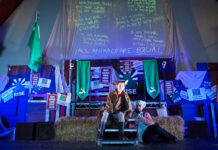We sat spellbound in the Holywell Music Room as soprano Gweneth Ann Rand, accompanied by Simon Lepper performed a miscellany of songs as part of the Oxford International Song Festival. READ ABOUT IT HERE
interspersed by short illustrated talks by Ashmolean curator Matthew Winterbottom, the inspired concert was scheduled half-way through the astonishing 75+ events of the former Oxford Leider Festival), which includes a dazzling array of concerts, masterclasses, recitals, talks, tours, workshops, newly commissioned pieces, dance, poetry, art and so much more.

The events take place in Oxford’s many exquisite venues – the Sheldonian, the Holywell Music Room, the Jacqueline du Pre Music Building, the Ashmolean Museum, college chapels, Harcourt Arboretum – over a packed two-week programme.
This is not music for football stadiums or warehouses. The songs (or leider) were set to poems, here by Auden, Yeats, Messiaen, Sean O Faolain and more, for one or two voices, accompanied by the piano.

Usually performed in drawing rooms and small halls, with no amplification, they rely on the power and clarity of the performers, and this is exactly what we got on Friday.
Gweneth Ann Rand, with Simon Lepper, performed their repertoire of songs from 2-200 lines long, with an astounding range of tone and mood, from mournful to magical and mischievous, flirtatious to grief-stricken, seductive to enraged.
Gweneth Ann Rand’s voice could be as soft as a kiss, a butterfly lighting on a flower, the next moment ringing out in anger and passion. Astounding. As was Simon Lepper’s rich and beautiful accompaniment, often finishing the phrase after the voice died away.

Between groups of songs, Matthew Winterbottom, Curator of Decorative Arts and Sculpture at the Ashmolean, gave a series of illustrated talks about the current exhibition “Colour Revolution: Victorian Art, Fashion and Design”.
Though my companion and I found the links between the exhibition and the music decidedly tenuous, the talks added enormously to our understanding of the exhibition itself.

This really is Oxford’s musical repertoire at its best, bringing the finest performers to the city, delighting the audiences and then sharing expertise in masterclasses and workshops.
It’s not a surprise then, that the Oxford International Song Festival has grown into the world’s largest festival of classical song. We’re lucky to have it on our doorstep – at least, until October 28! For more details go to https://oxfordsong.org
SHEILA BAILEY


















